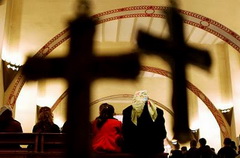CHRISTIANITY IN TURKEY
Christianity has a long history in Anatolia (nowadays part of the Republic of Turkey's territory), which is the birth place of numerous Christian Apostles and Saints, such as Apostle Paul of Tarsus, Timothy, St. Nicholas of Myra, St. Polycarp of Smyrna and many others.
Two out of the five centers of the ancient Pentarchy are in Turkey: Constantinople (Istanbul) and Antioch (Antakya). Antioch was also the place where the followers of Jesus were called "Christians" for the first time in history, as well as being the site of one of the earliest and oldest surviving churches, established by Saint Peter himself. For a thousand years, the Hagia Sophia was the largest church in the world.
Turkey is also home to the Seven Churches of Asia, where the Revelations to John were sent. Apostle John is reputed to have taken Virgin Mary to Ephesus in western Turkey, where she spent the last days of her life in a small house, known as the House of the Virgin Mary, which still survives today and has been recognized as a holy site for pilgrimage by the Catholic and Orthodox churches, as well as being a Muslim shrine. The cave of the Seven Sleepers is also located in Ephesus.
All of the first
seven Ecumenical Councils
which are recognized by both the Western and Eastern churches were
held in present-day Turkey. Of these, the Nicene
Creed, declared with the
First Council of Nicaea
(İznik) in 325, is of utmost importance and has provided the
essential definitions of present-day Christianity.
Since up to 98 percent of the population are Muslims, Christians are
obviously a minority religion in Turkey. Because it is a secular
country, the only Muslim country in the world that has no state
religion, the Constitution guarantees religious freedom, and
tolerance is the rule. The population includes members of the
Armenian Apostolic and Greek Orthodox churches, Roman and Eastern
Catholics, and Jews. Today, approximately 120,000 Christians and
26,000 Jews live in Turkey, out of 73 million of the total
population.
Dispute continues, however, over what part Islam should have in Turkish life. It is one of the most controversial issues in Turkey today, and may at some point alter whether Turkish society is organized on a secular or religious basis.
After the crucifixion of Jesus Christ, many of the early Christians, escaping from persecutions in Jerusalem, came to Asia Minor and settled in different cities like Ephesus, Hierapolis and Cappadocia. St. Paul preached in Perge, Derbe, Lystra, Psidian Antioch, Ephesus and Konya. St. John stayed for a while in Ephesus together with Virgin Mary and, after he returned from Patmos where he was exiled, died in Ephesus. St. Peter settled in Antioch and build the first Christian church carved in a cave. St. Philip settled in Hierapolis but was killed together his family by the Romans.
Christianity was declared as the official religion in 380, during the reign of Theodosius I, and destruction of pagan temples was legalized. Even so, throughout the Byzantine era Christianity had great ups and downs in popularity. Many found the road to piety confusing and assorted schisms between the Roman Catholic church and the Orthodox Byzantine church certainly didn't simplify matters. Add this inter-faith bickering to the "Dhimmi" tax (50 percent of earnings for non-Muslims as opposed to the tithing for Muslim believers) for those living on Ottoman-held lands, no wonder large numbers of peasants converted their faith to Islam. Islam was also a relatively simple path to follow - profess belief in One God and the mission of his Prophet Muhammed, and follow the Five Pillars of Faith.
Gradually, Christianity in Turkey disintegrated, so that when the Islamic Ottomans finally conquered the Byzantine Empire, it was inevitable that what had been a predominantly Christian region would be no more.
Another important fact for Christians is that first Ecumenical Councils were made at Nicea (Iznik today) in the Marmara Region of Turkey, between Bursa and Istanbul.

